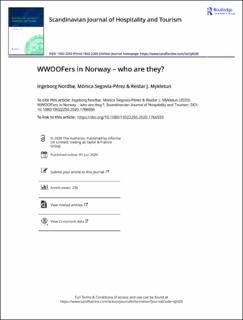WWOOFers in Norway – who are they?
Peer reviewed, Journal article
Published version
Permanent lenke
https://hdl.handle.net/11250/2725496Utgivelsesdato
2020-06Metadata
Vis full innførselSamlinger
Originalversjon
Nordbø, I., Segovia-Perez, M., Mykletun, R.J. (2020) WWOOFers in Norway – who are they? Scandinavian Journal of Hospitality and Tourism, 20(5), 1-19. 10.1080/15022250.2020.1766559Sammendrag
Some travellers “want to make a difference” and develop themselves while exploring the world through programmes offered by international volunteer organisations, such as the WWOOF initiative (WorldWide Opportunities on Organic Farms). This international network promotes organic farming and sustainable lifestyles by connecting hosts and volunteers who are willing to work for hosts in exchange for food, accommodation, and insight into organic farming. However, who are these WWOOFers? While researched mainly by qualitative studies in other countries (e.g. Australia, Hawaii, Japan, U.S.A.), this is the first cross-sectional study of WWOOFers in Europe. Data was collected by online questionnaires to WWOOFers registered at WWOOF Norway (n = 1184; response rate = 85%). These WWOOFers come from 77 countries, among which U.S.A., Germany, France, Italy, Spain, and the Netherlands dominates. They are mainly young, well-educated, well-travelled, urban people wanting to explore rural living. Some, but not all report lifestyles and behavioural intentions in line with the WWOOF philosophy. Age and gender differences apply. Through factor analyses, the study identified seven personal characteristics, including, in descending order Empathy, Goal-orientation, Outgoing, Reserved, Recognition seeking, Child-oriented, and Egoistic-materialistic. The study expands the current insights and partly contradicting previous research.

